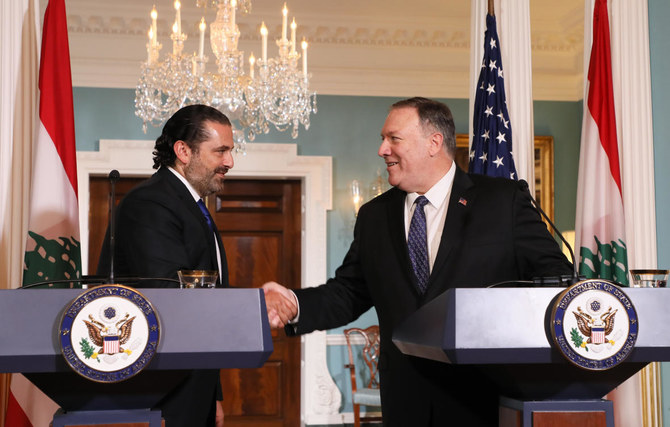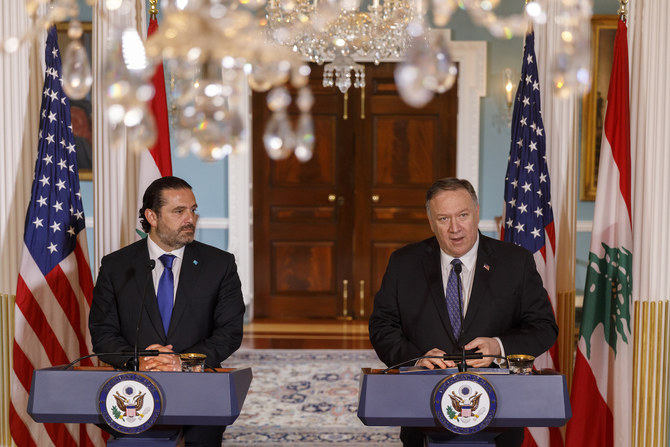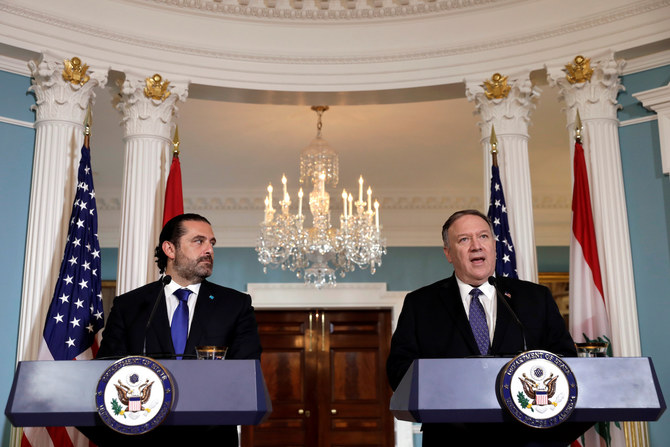BEIRUT: US Secretary of State Mike Pompeo on Thursday praised the commitment of the Lebanese government to protecting its country in the face of the threat posed by Iran and Hezbollah.
It came during his meeting in Washington with Lebanese Prime Minister Saad Hariri. David Schenker, the assistant secretary of near eastern affairs, and David Hill, undersecretary of state for political affairs, were also present.
Pompeo also reassured Hariri of “the commitment of the United States to support Lebanon and its institutions, to preserve its security and stability, and to procure the needs of the Lebanese people.”
He also praised “Lebanon’s commitment to providing support to more than one million Syrian refugees residing on its soil, who have fled the injustice of the Assad regime.”
“We call for continuing the discussions related to the remaining points related to the Blue Line (the UN’s border demarcation between Lebanon and Israel) and the Lebanese maritime borders (with Israel). We are ready to mediate the maritime dispute between Lebanon and Israel and hope to reach concrete results,” Pompeo added.
After the meeting, Hariri said he hoped to “reach a conclusive decision in the upcoming months regarding the border demarcation negotiations.” He thanked the US for its “continuous support for the Lebanese Army,” and restated Lebanon’s commitment to fighting terrorism.
He also noted Lebanon’s “continuous support for the Cedar Conference (of international investors) and its investment plan, which is highly necessary to the Lebanese economy.” During a Cedar conference in Paris in April 2018, Lebanon secured pledges of $10.2 billion in loans and $860 million in grants, which are dependent on economic reforms.
Earlier, Hariri spent more than an hour with David Malpas, president of the World Bank, during which he assured the financier: “Lebanon’s relationship with the World Bank is very important and we continue to cooperate in various sectors, especially electricity, telecommunications and waste management.”
The prime minister said that he also explained to Malbas “the challenges that we face in Lebanon on the economic and political levels.”
Regarding the IMF’s reluctance to cooperate with Lebanon, Hariri said: “The IMF focuses mainly on the financial situation, while the World Bank is our partner and we are executing many projects with them.”
Asked whether or not his meetings in Washington made him optimistic that Lebanon’s credit rating will improve, Hariri said: “I know that Lebanon’s financial figures are critical and we have a great challenge with (credit rating agency) Standard & Poor’s, and we are working on improving our rating. However, this does not mean that our situation is not good; on the contrary, we are taking all necessary steps that would lead us to safety. The most important thing is not to respond to bad news by not performing our duties, and to reach safety.”
Lebanese authorities are awaiting the latest Standard & Poor’s report, which is due to be released on Aug. 23. They fear the nation’s credit rating will be downgraded to CCC, which would have negative repercussions on its economy, the banking sector and on the value of the Lebanese pound, especially given the strained political situation in the country at a time when it needs to begin implementing reforms required by Cedar investors.
Hariri was concluding a visit to Washington that comes less than a week after the Lebanese government reconvened following 40 days of inactivity in the wake of an incident in Mount Lebanon on June 30, during which two bodyguards working for Minister for Refugee Affairs Saleh Al-Gharib were shot and killed. This led to a political standoff between Druze leaders Walid Jumblatt, head of the Progressive Socialist Party, and Talal Arslan, leader of the Democratic Party and an ally of Al-Gharib, who each blamed the other’s supporters for the violence. A reconciliation agreement was reached on Aug. 9.
During his visit, Hariri also met Undersecretary of Defense John Rudd. They discussed “ways to support the Lebanese army and the security forces,” according to the prime minister’s office. He also met with Treasury officials, including Marshall Billingslea, the Treasury Department’s assistant secretary for terrorist financing, in light of the announcement by the US of fresh sanctions on Hezbollah officials. On July 9, the Treasury Department’s Office of Foreign Assets Control imposed sanctions on Hezbollah MPs Amin Sherri and Mohammad Raad, and on Wafiq Safa, Hezbollah’s security chief.
The US accuses Hezbollah of “using its members in the Lebanese Parliament to manipulate institutions to support the financial and security interests of the terrorist group and to promote malicious activities of Iran.” It also accuses Hezbollah of “threatening economic stability and security in Lebanon and the region as a whole, at the expense of the Lebanese people.”
Pompeo praises Lebanese government for standing firm against Iranian threat
Pompeo praises Lebanese government for standing firm against Iranian threat

- Pompeo assures PM Saad Hariri Washington is committed to supporting Lebanon and preserving security
- Hariri thanks US for “continuous support,” pledges to continue battling terrorism and working on economic reform
UN Security Council to meet on Iran as Russia, China and Pakistan push for ceasefire

- Russia, China and Pakistan circulated a draft resolution text and asked members to share comments by Monday evening
- A resolution needs at least nine votes in favor and no vetoes by the US, France, Britain, Russia or China to pass
UNITED NATIONS: The UN Security Council will meet Sunday to discuss US strikes on Iran’s nuclear sites as Russia, China and Pakistan proposed the 15-member body adopt a resolution calling for an immediate and unconditional ceasefire in the Middle East.
It was not immediately clear when it could be put to a vote. The three countries circulated the draft text, said diplomats, and asked members to share their comments by Monday evening. A resolution needs at least nine votes in favor and no vetoes by the United States, France, Britain, Russia or China to pass.
The US is likely to oppose the draft resolution, seen by Reuters, which also condemns attacks on Iran’s nuclear sites and facilities. The text does not name the United States or Israel.
The world awaited Iran’s response on Sunday after President Donald Trump said the US had “obliterated” Tehran’s key nuclear sites, joining Israel in the biggest Western military action against the Islamic Republic since its 1979 revolution.
Iran requested the UN Security Council meeting, calling on the 15-member body “to address this blatant and unlawful act of aggression, to condemn it in the strongest possible terms.”
Israel’s UN Ambassador Danny Danon said in a statement on Sunday that the US and Israel “do not deserve any condemnation, but rather an expression of appreciation and gratitude for making the world a safer place.”
UN Secretary-General Antonio Guterres on Saturday branded the US strikes on Iran as a “dangerous escalation in a region already on the edge – and a direct threat to international peace and security.”
“At this perilous hour, it is critical to avoid a spiral of chaos. There is no military solution. The only path forward is diplomacy. The only hope is peace,” Guterres said in a statement.
Jordanian king chairs security meeting, affirms national unity amid regional tensions

- King Abdullah II said that Jordan will not permit any party to exploit regional tensions to undermine the country’s firm stance on key Arab issues
- The Iran-Israel conflict has escalated following US strikes on Sunday, as Tel Aviv and Tehran exchanged attacks for the 10th day
LONDON: King Abdullah II of Jordan chaired a meeting on Sunday with officials and security agencies to emphasize national unity in the face of regional developments.
King Abdullah urged government institutions to tackle the economic effects of escalating tensions in the Middle East during the meeting at Al-Husseiniya Palace in Amman.
He said that Jordan will not permit any party to exploit regional tensions to undermine the country’s firm stance on key Arab issues. He said that Amman is committed to achieving a ceasefire in the Gaza Strip and the establishment of a Palestinian state, the Petra news agency reported.
He called for increased international efforts to achieve lasting peace in the region and to de-escalate tensions through diplomatic dialogue and negotiations, Petra added.
The Iran-Israel conflict has escalated following US strikes on three nuclear sites inside Iran on Sunday morning. Tel Aviv and Tehran have exchanged attacks over the past 10 days, risking a full-scale war in the Middle East.
The meeting was attended by several key figures, including Prime Minister Jafar Hassan, Foreign Minister Ayman Safadi, Speaker of the House of Representatives Ahmad Safadi, Chairman of the Joint Chiefs of Staff Maj. Gen. Yousef Huneiti, General Intelligence Department Director Maj. Gen. Ahmad Husni, and Public Security Directorate Director Maj. Gen. Obaidallah Maaytah.
Blast rocks church in Syria’s Damascus, witnesses say

DAMASCUS: A blast rocked the Mar Elias Church in the Dweila neighborhood of Syria’s capital Damascus on Sunday, according to witnesses.
One told Reuters a suicide bomber detonated himself inside the church. A spokesperson for Damascus security forces did not immediately respond to a request for comment.
Israeli authorities arrest four Al-Aqsa guards, storm old prayer hall

- Israeli forces storm prayer hall beneath the Qibli Mosque, damaging its contents
- Jerusalem Governorate says action is part of efforts to assert control over the mosque’s administration and undermine the Waqf authority
LONDON: Israeli authorities arrested four guards at the Al-Aqsa Mosque during a search raid on Saturday night inside the compound’s old prayer hall.
The Jerusalem Governorate, affiliated with the Palestinian Authority, said that the detainees were identified as Mohammad Arbash, Ramzi Al-Zaanin, Basem Abu Juma, and Iyad Odeh. Several other guards and a firefighter in the compound were interrogated at the site by Israelis, the Wafa news agency reported.
Just after midnight on Saturday, Israeli forces stormed the old prayer hall at Al-Aqsa, a subterranean area beneath the Qibli Mosque, damaging its contents after breaking into storage cabinets and searching the premises, Wafa added.
The governorate said the latest Israeli action was part of efforts to assert control over the mosque’s administration and undermine the authority of the Islamic Waqf Department in Jerusalem.
After less than a week of complete closure under a state of emergency linked to the ongoing war with Iran, the Al-Aqsa Mosque was reopened by Israeli authorities, allowing Palestinian and other Muslim worshippers to enter the site under strict regulations, Wafa reported.
Palestinian Authority considers phasing out shekel as Israeli banks refuse to accept surplus

- Israeli banks’ refusal to accept the transfer of surplus shekels means fewer foreign currencies that are necessary for commerce and business
- Israel’s finance minister in June ended a waiver that allowed Israeli banks to engage with Palestinian ones without being scrutinized for money laundering and financing extremism
LONDON: The Palestinian Authority is considering replacing the Israeli shekel as the primary currency in circulation due to its increasing accumulation in the banks.
The Palestine Monetary Authority announced on Sunday that it has taken significant steps to address the growing accumulation of shekels in Palestinian banks after Israeli banks’ continuing refusal to accept the transfer of surplus shekels in exchange for foreign currencies necessary for commerce and business.
The PMA is considering alternative options, including a shift away from using the shekel as the primary currency in circulation, the Wafa news agency reported.
In early June, Israeli Finance Minister Bezalel Smotrich ended a waiver that allowed Israeli banks to engage with Palestinian banks without being scrutinized for money laundering and financing extremism.
Smotrich, who has been outspoken about weakening the Palestinian Authority and opposes the establishment of a Palestinian state, made this decision shortly after being sanctioned by the UK and four European countries for inciting violence in the occupied West Bank.
The PMA said it aims to create a more resilient and sustainable digital economy in Palestine and has consulted various economic sectors and the Union of Chambers of Commerce, Industry, and Agriculture before it makes a final decision. Alongside phasing out the Israeli shekel, the PMA studied digital payment strategies to avoid shekel accumulation in Palestinian banks, Wafa reported.





















